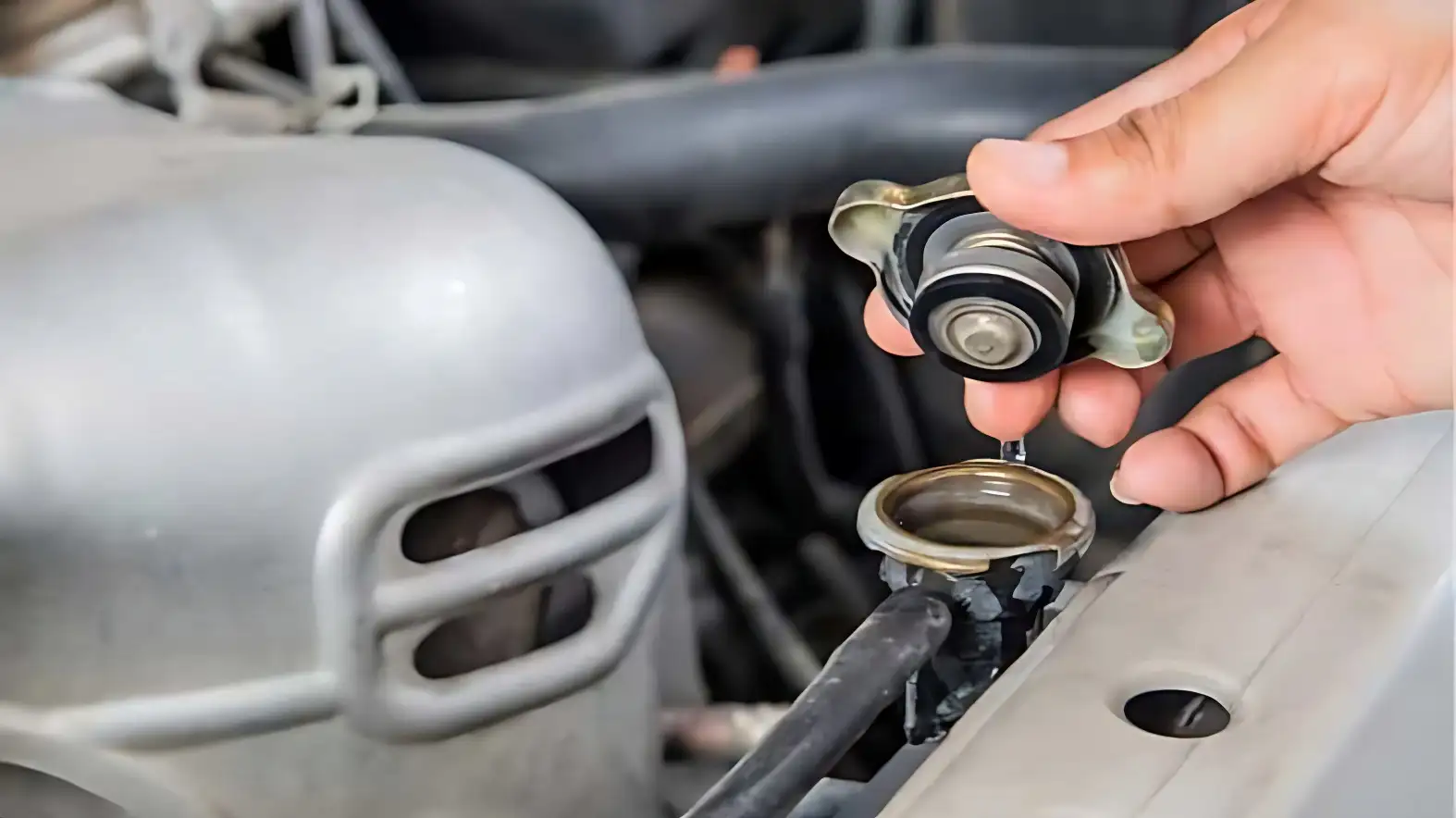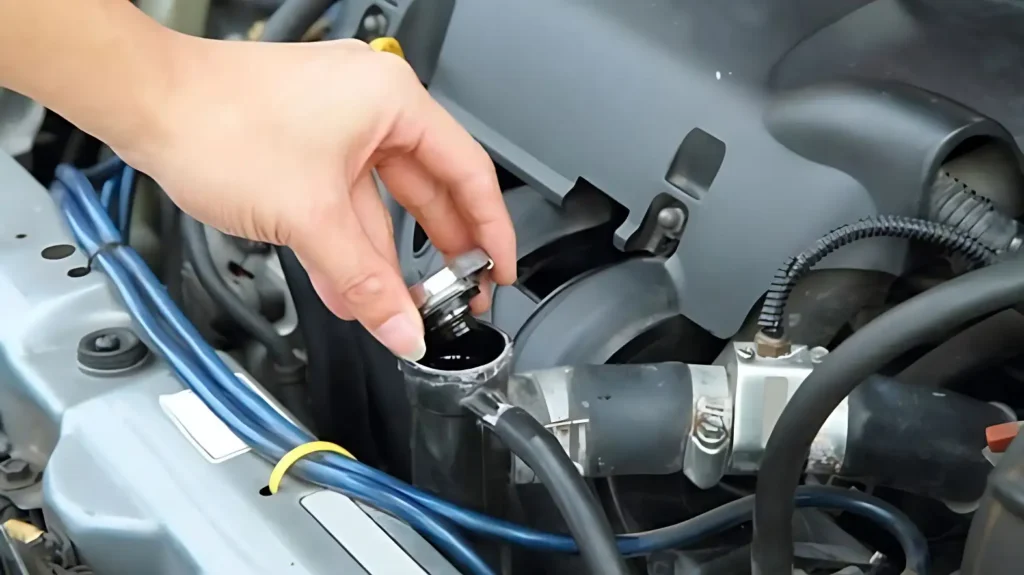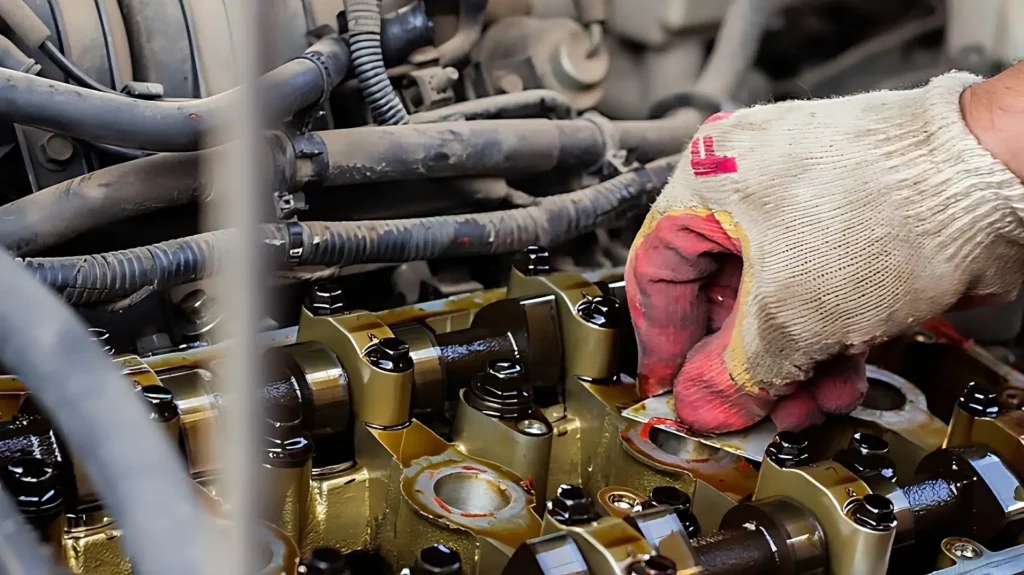Have you noticed your car overheating more often than usual? If so, the culprit may be a bad radiator cap or head gasket.
We have seen many engine damage situations caused by bad radiator caps and head gaskets in my 10 years as a repair.
We will compare the two situations, identify them, and offer solutions in this article.
Bad Radiator Cap Or Head Gasket?
A bad radiator cap can cause overheating and coolant loss. While a blown head gasket can result in white smoke from the exhaust, engine misfire, and coolant mixing with the oil. Both issues require prompt repair to prevent further damage.

How To Identify A Bad Head Gasket Or A Bad Radiator Cap?
Here is a guideline on how to identify a bad head gasket or a bad radiator cap:
Symptoms of a Bad Head Gasket
- Overheating engine
- Bubbling in the radiator cap and coolant
- Milky sludge on the underside of the oil filler cap or the dipstick
- Clearly, coolant is seeping onto the ground below the head gasket.
- The radiator and reservoir overflow with bubbles.
- Oil has a milky discoloration
- Cylinder misfire
- Big cloud of smoke pouring from the exhaust
- Engine gauge showing maximum temperature after a few minutes
Symptoms of a Bad Radiator Cap
- Leaking coolant
- Overflowing coolant reservoir tank
- Collapsed radiator hose
- The appearance of white streaks
- Hose bursts caused by coolant pressure fluctuations
- Excessive pressure causes the cooling system to fail
Problems Associated with a Bad Head Gasket

A head gasket is a critical component that sits between the engine block and the cylinder head.
Its purpose is to seal the combustion chamber and keep oil and coolant from mixing. When a head gasket fails, it can cause several problems, including:
Oil in the coolant:
A blown head gasket can allow engine oil to seep into the cooling system, resulting in a frothy, chocolate milk-like appearance of the coolant.
Loss of power:
A blown head gasket can reduce compression in one or more cylinders, resulting in a rough running engine and a noticeable decrease in power.
Overheating:
A bad head gasket can cause an engine to overheat, which can lead to serious engine damage if not addressed promptly.
Problems Associated With a Faulty Radiator Cap
The radiator cap is a small but important component of a car’s cooling system. It maintains pressure in the system and prevents coolant from boiling over.
When a radiator cap fails, it can cause several problems, including:
Coolant leaks:
A faulty radiator cap can cause coolant to leak from the system, resulting in low coolant levels and potentially causing engine damage.
Overheating:
A bad radiator cap can cause an engine to overheat, as it fails to maintain proper pressure in the cooling system.
Collapsed or torn hoses:
A faulty radiator cap can cause hoses in the cooling system to collapse or tear, which can lead to coolant leaks and overheating.
Fixing a Bad Radiator Cap
- Turn off your engine and wait for it to cool down.
- Locate the radiator cap and remove it.
- Inspect the cap for any signs of damage or wear, such as cracks or a worn-out seal.
- Replace the radiator cap with a new one that matches your car’s make and model.
- Tighten the new radiator cap securely and start your engine.
- Observe your car for any signs of overheating or coolant loss.
If replacing the radiator cap doesn’t solve the issue, it’s best to consult a professional mechanic to diagnose and repair any underlying problems.
Fixing a Bad Head Gasket
- Drain the coolant and oil from your engine.
- Disconnect any electrical and mechanical components attached to the engine.
- Remove the cylinder head bolts and lift off the cylinder head.
- Clean the cylinder head and engine block mating surfaces thoroughly.
- Inspect the head gasket for any signs of damage or wear, such as cracks or blown sections.
- Replace the head gasket with a new one that matches your car’s make and model.
- Reinstall the cylinder head and tighten the bolts to the manufacturer’s specifications.
- Reconnect any electrical and mechanical components.
- Refill the engine with new oil and coolant.
- Start your engine and observe it for any signs of overheating or coolant loss.
Fixing a bad head gasket can be a complicated and time-consuming process. If you’re not confident in your mechanical skills, it’s best to seek professional help.
Prevention Measures for a Bad Head Gasket

Keep Your Engine Cool:
The excessive heat generated by an overheating engine can cause severe damage to the head gasket.
To prevent this, ensure that your vehicle’s cooling system is functioning correctly, and check the coolant levels regularly.
Change Your Oil Regularly:
Old and dirty engine oil can corrode the head gasket, leading to leaks and failure. Change your oil at regular intervals to prevent this from happening.
Use High-Quality Coolant:
Using a low-quality coolant can lead to corrosion and damage to the head gasket.
Always use a high-quality coolant and follow the manufacturer’s recommended maintenance schedule.
Follow Torque Specifications:
Use the correct torque wrench and follow the recommended pattern and specifications when tightening head bolts.
This will prevent the head gasket from being damaged due to improper installation.
Prevention Measures for a Bad Radiator Cap:
Replace the Radiator Cap:
Radiator caps wear out over time and lose their ability to maintain the correct pressure. Replace your radiator cap periodically to prevent overheating and leaks.
Inspect the Radiator:
Check the radiator for leaks or damage, which can cause coolant loss and overheating.
Replace a damaged radiator as soon as possible to prevent further damage to your vehicle.
Check the Coolant Reservoir:
Make sure the coolant reservoir is not cracked or damaged, as this can cause coolant loss and overheating.
Replace a damaged coolant reservoir to prevent further damage to your vehicle.
Avoid Overfilling:
Overfilling the coolant reservoir can cause pressure buildup and damage to the radiator cap. Always follow the manufacturer’s recommended coolant level.
Can A Bad Head Gasket Cause A Bad Radiator Cap?
Yes, it is possible for a bad head gasket to cause a bad radiator cap. Let’s dive into the details of this relationship and what it means for your vehicle.
Before we can explore the relationship between a bad head gasket and a bad radiator cap, it’s essential to understand the function of each component.
The head gasket is a crucial part of your car’s engine that seals the combustion chambers and maintains proper compression.
The radiator cap, on the other hand, regulates the pressure in the cooling system and prevents coolant from boiling over.
How a Bad Head Gasket Can Cause a Bad Radiator Cap?
A bad head gasket can cause a variety of issues with your car’s cooling system.
One common problem is that the head gasket may allow combustion gases to enter the cooling system.
This can cause the pressure in the system to increase, which can cause the radiator cap to malfunction.
Specifically, the increased pressure can cause the pressure relief valve in the radiator cap to open prematurely, leading to coolant loss.
Additionally, a bad head gasket can also cause coolant to leak into the engine oil.
This can lead to increased pressure in the oil system, which can cause the oil pressure relief valve to open prematurely.
When this happens, the oil pressure drops, and the oil may not be able to properly lubricate the engine.
This can cause significant damage to the engine if left unchecked.
FAQs
Can A Bad Radiator Cap Cause The Head Gasket To Fail?
Yes, a bad radiator cap can cause the head gasket to fail by allowing excessive pressure to build up in the cooling system.
What Are The Symptoms Of A Bad Head Gasket?
Symptoms of a bad head gasket include engine overheating, white smoke from the exhaust, loss of power, coolant in the oil, and air bubbles in the radiator.
Can A Bad Head Gasket Cause The Radiator Cap To Fail?
Yes, a bad head gasket can cause the radiator cap to fail by allowing combustion gases to enter the cooling system and increasing pressure.
How Do I Determine If I Have A Bad Radiator Cap Or Head Gasket?
A pressure test of the cooling system can help determine if the radiator cap or head gasket is the problem.
Additionally, a visual inspection for leaks or other signs of damage can help pinpoint the issue.
Conclusion
In conclusion, if you’re experiencing engine problems like overheating or coolant loss, a bad radiator cap or head gasket could be the culprit.
A faulty radiator cap can cause pressure to build up in the coolant system and lead to coolant loss.
While a damaged head gasket can cause coolant to leak into the engine and result in overheating.
It’s important to address these issues promptly to prevent further damage to your engine. Hence, watch for symptoms of concern and seek professional aid if needed.
